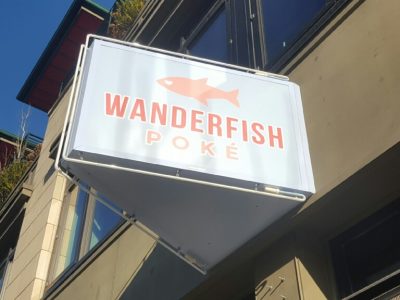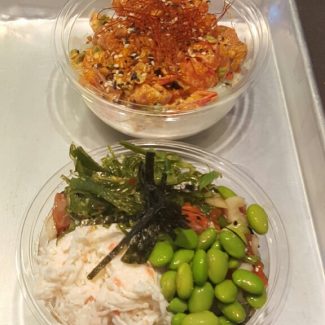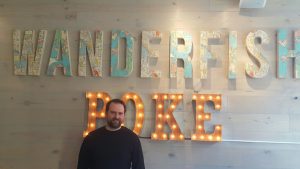From storage servers to sustainable fish, and beyond: Q&A with TMMBA alum Erik Logan
Erik Logan, Technology Management MBA Class of 2016 valedictorian, invited us to visit his newest business venture and talk about how TMMBA gave him the foundation to expand his entrepreneurial skills. For more interviews with TMMBA alumni entrepreneurs, click here.

Wanderfish Poke in Capitol Hill, Seattle
Erik Logan serves as the Chief Executive Officer of Pogo Linux, a server and storage company based in Redmond, Washington. In addition to Pogo, Erik is currently active in many other local start-ups including Wanderfish Poke and IoCurrents. Erik will also be a mentor in the new MS in Entrepreneurship program at UW’s Foster School of Business.
Tell us about your business
Erik: I am the co-owner of a new restaurant called Wanderfish Poke, a fast casual poke bar in the Capitol Hill neighborhood of Seattle. I graduated from TMMBA in June of 2016; we started the business before the program ended. The idea came to us after a trip to Hawaii, where we had poke for the first time. We thought, “This is really good. Why don’t we have more of this on the mainland?” We looked around, and found a few places in New York and a few places in LA, but there weren’t any poke joints in Seattle. So we looked at what some of the other restaurants were doing, put our own spin on it, and put the business together. We signed our lease in July 2016, and had our grand opening on October 1st.
A big part of entrepreneurship is value engineering. We chose this retail space because the location is really good, with lots of foot traffic, but also because it was built out for a FroYo store. They had done a huge amount of work to get the space to the level it is now, so when we bought it, we already had a lot of the stuff we needed. This helped us get the project  up and running very quickly.
up and running very quickly.
One of our differentiators is that we wanted to be as sustainable as possible, especially with our fish offerings. For example, our Ahi is fresh from Hawaii, and we work with one of the few fishing companies that have a complete vertical supply chain for their fish. The people who catch the fish are the same people who take it off the boat, process it, and then sell it. It was really important for us to not just sell food, but to sell it responsibly.
When we last talked to you, you were CEO of Pogo Linux. Why the switch out of technology and into the restaurant industry?
Erik: A lot of the decision to start Wanderfish was simply discovering the opportunity to do something different. I’ve been with Pogo for over 18 years, as CTO and then CEO. It’s a thriving company, selling servers and storage to some great local companies like Vulcan and the Allen Institute. But at some point, you need to expand your horizons a little. We’ve done technology for so many years, we were interested in starting something in a different space, and Wanderfish Poke was an opportunity to do that.
Do you find any overlaps between running Wanderfish Poke and your past experiences?
Erik: Yes. There are a lot of things from my tech business that are very similar to running a restaurant. For example, with Pogo Linux, we purchase components, build them into systems, and ship the finished goods to customers. At Wanderfish Poke, we’re buying raw food and transforming it into bowls. So there are a lot of supply chain issues that are very similar. In fact, some of the software that we’ve written for our first company is almost a direct drop-in for what we’re doing at the restaurant.

Delicious! Two poke bowls from Wanderfish Poke.
As far as logistics, we have to ask ourselves questions like ‘how much do you prep, how long, how do you manage that process, and how many people do you need on the line at any given time?’ At the end of the day, it’s all food and labor costs. The other problem is that everything we order is perishable, so we have to take that into account. Some things will last only two days; some things will last two weeks. It becomes a complex puzzle with the logistics. It’s different from selling widgets, for example, because you put a widget on the shelf and it can be there forever.
One area where the restaurant is very different from past experiences, and what I find to be the most exciting part, is the menu. Although technology moves quickly, product development times can be slow and cumbersome. There is so much more freedom with creating new poke bowls and other menu items. It is also a much more creative process, and one that we really enjoy.
How did TMMBA prepare you to start your business?
Erik: One of the reasons I wanted to get an MBA was to do some different things professionally, and I’ve found that the TMMBA has afforded me the ability to do that in many ways. Wanderfish Poke is just one of the new projects I’ve started. I’m also advising a few other startups in Seattle right now, and I’m doing some small angel investing. A lot of what I learned in the TMMBA has translated to all of these projects. I’m using the information from Entrepreneurship Expo Night and Ben Hallen’s class as I advise new startups on their pitch. When helping a start-up through their initial round of financing, I realized that what I learned in Lance Young’s class was an enormous help. It’s all relevant stuff.
For Wanderfish Poke specifically, I can apply almost everything I learned in the TMMBA program. I’ve never been this heavily involved in cost accounting, so the Accounting class was a big one for me. Another area is Operations — theory of constraints, queues, etc. We’ve even tried to calculate utilization rates to minimize how long customers have to wait in line. Financial Accounting was also really useful. I had a lot of practical knowledge to begin with, but TMMBA helped fill in some of the holes. Overall, I have found that the courses opened my mind to new ways of thinking. As an augment to what I already knew, the Technology Management MBA continues to be hugely valuable.
Wanderfish Poke in the press:
Sustainable Poke Hits Capitol Hill Today
